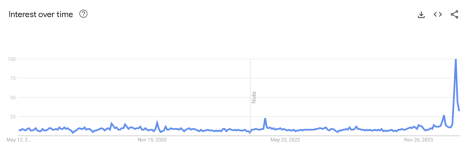
Blake McAlpin | Student Life Editor
May 21, 2024
The recent protests on college campuses across America have drawn attention to a somewhat obscure word. Defined by Merriam-Webster, the term divesting means “to take something away from someone or something else.”
So, what do the protests have to do with divestment? Around the end of April, college students across the country began protesting the Israel-Palestine conflict by organizing encampments across campuses with the intention for university boards to cut ties with corporations and organizations funding the ongoing conflict.
For most, divestment is not an everyday term. When media coverage began covering the students calling for such action, Google searches seeking to define the word spiked. Many universities and institutions do not directly fund Israel, but rather employ financial management firms who facilitate investment portfolios including companies that do support Israel. This is what has ultimately led to a call for divestment. Columbia University has been prevalent in the media as students have advocated strongly for the university to reevaluate its funding towards such companies. In December of 2023, Columbia graduate student Ray Guerrero published a request from the Columbia University Apartheid Divest organization, on behalf of their coalition and 89 other student organizations. The proposal specifically targets corporations that are believed to profit from or facilitate the Israeli occupation of Palestinian territories. Some of these companies include those providing security services, construction, and technology used in the Israeli settlements and military operations.
 Extreme spike in search results for the phrase “Divestment definition.” (Googles search engine statistics)
Extreme spike in search results for the phrase “Divestment definition.” (Googles search engine statistics)When discussing the protests at American universities, San Clemente High School senior Anna Kerzhanovich stated, “Before the protest, I kind of understood what divesting was about economics but I did not know the extent to what it really means until I saw the protest.” She followed with, “I was reading an article about some of the protests and read the chant, ‘Divest from genocide, Columbia take a side.’ After I saw that I looked into what divesting is and it’s so much deeper than what I thought.”
On March 28th, the University of Michigan issued a response to the calls for divestment from Israel. Regent Hubbard from the Public Affairs Department stated, “After deliberation, we have decided to stand by our longstanding policy. We will continue to shield the endowment from political pressures and base our investment decisions on financial factors such as risk and return.” Here, Hubbard reviewed the calls for divestment and blatantly justified a priority of profit over political actions affecting human lives. Even some of the most prestigious scholars at top universities prove once again, that history does indeed repeat itself.
As the term divestment becomes part of our daily vocabulary in the high school space, we are better prepared to understand the motives and end goals of potential protests at our campuses to come. This is a worthwhile education, as our peers have shown us that perhaps there is something we can do to help put an end to the Israel-Palestine conflict.

Leave a Reply